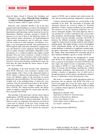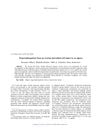
Mohamed Kandil suggests renaming Polycystic Ovary Syndrome to "Polyfollicular Anovulatory Androgenic Syndrome" to better describe its symptoms, but concerns exist that it may not cover all related issues like obesity and depression.
September 2022 in “Düzce Tıp Fakültesi Dergisi” Infertility requires quick, thorough, and cost-effective evaluation, including medical history, physical exams, and psychological support.
January 2005 in “Elsevier eBooks” Insulin resistance and hyperinsulinism are linked to fertility issues and can worsen symptoms of PCOS.
 December 2017 in “PubMed”
December 2017 in “PubMed” Society's pressure to have children later in life favors genes that increase the risk of early baldness in male offspring.
 16 citations,
September 2018 in “Clinical Biochemistry”
16 citations,
September 2018 in “Clinical Biochemistry” The document concludes that more research is needed to fully understand the causes of PCOS.
 2 citations,
January 2017 in “Cambridge University Press eBooks”
2 citations,
January 2017 in “Cambridge University Press eBooks” Manage PCOS in primary care with weight loss, psychological support, medication, and monitoring for health risks.
 November 2018 in “International Journal of Current Pharmaceutical Research”
November 2018 in “International Journal of Current Pharmaceutical Research” PCOS is a hormonal disorder causing symptoms like irregular periods and acne, and increases the risk of diabetes and heart disease.
 January 2020 in “International Journal of Research”
January 2020 in “International Journal of Research” High testosterone increases heart disease risk in women with PCOS.
 24 citations,
March 2017 in “Archives of Gynecology and Obstetrics”
24 citations,
March 2017 in “Archives of Gynecology and Obstetrics” The study found that women with hyperandrogenic PCOS have higher levels of AKT1 and AKT2 proteins in their cells, which may lead to cell dysfunction.
 January 2006 in “Fertility and Sterility”
January 2006 in “Fertility and Sterility” The book provides a detailed guide on managing Polycystic Ovary Syndrome and is useful for physicians.
 216 citations,
November 1999 in “Fertility and Sterility”
216 citations,
November 1999 in “Fertility and Sterility” Testing basal 17-HP levels is a good way to screen for nonclassic adrenal hyperplasia in women with high androgen levels.
 66 citations,
November 2001 in “European journal of endocrinology”
66 citations,
November 2001 in “European journal of endocrinology” Low SHBG and high FAI, FT, and DHEAS levels are effective in identifying PCOS.
 54 citations,
November 2017 in “Scientific Reports”
54 citations,
November 2017 in “Scientific Reports” The study found that certain microRNAs are higher in the cells and lower in the fluid of women with a specific type of polycystic ovary syndrome, and one microRNA could potentially help diagnose the condition.
 50 citations,
December 2010 in “Bjog: An International Journal Of Obstetrics And Gynaecology”
50 citations,
December 2010 in “Bjog: An International Journal Of Obstetrics And Gynaecology” South Asian women with PCOS experience more psychological distress and have a poorer quality of life, especially in social relationships, with hirsutism affecting them more than obesity.
 48 citations,
January 2003 in “Fertility and Sterility”
48 citations,
January 2003 in “Fertility and Sterility” There's no significant link between the D19S884 marker at the insulin receptor gene and polycystic ovary syndrome.
 44 citations,
June 2012 in “Endocrinology”
44 citations,
June 2012 in “Endocrinology” High levels of androgens during early development may cause PCOS-like symptoms.
 42 citations,
July 2017 in “Scientific Reports”
42 citations,
July 2017 in “Scientific Reports” Women with PCOS are more likely to have insulin resistance and obesity, especially those with the most severe type I PCOS.
 37 citations,
January 2008 in “Gynecological Endocrinology”
37 citations,
January 2008 in “Gynecological Endocrinology” Shorter CAG repeats in a specific gene may increase male hormone activity and symptoms like acne and excess hair in women with PCOS.
 34 citations,
May 2017 in “Seminars in Reproductive Medicine”
34 citations,
May 2017 in “Seminars in Reproductive Medicine” Women with PCOS have a higher risk of diabetes, heart problems, certain cancers, and mental health issues, but early treatment can help manage these risks.
 30 citations,
April 2014 in “Seminars in Reproductive Medicine”
30 citations,
April 2014 in “Seminars in Reproductive Medicine” Diagnosing PCOS in teenagers is hard because its symptoms often look like normal puberty, and there's a need for better diagnosis methods and agreement on criteria.
 27 citations,
March 2018 in “Fertility and Sterility”
27 citations,
March 2018 in “Fertility and Sterility” Women with PCOS who had antiandrogenic treatment before pregnancy had fewer complications than those without treatment.
 21 citations,
June 2016 in “Reproductive Sciences”
21 citations,
June 2016 in “Reproductive Sciences” Women with PCOS, especially those overweight, have higher levels of IL-18 in their endometrium, which may affect fertility.
 21 citations,
November 2015 in “Archives of Gynecology and Obstetrics”
21 citations,
November 2015 in “Archives of Gynecology and Obstetrics” Greek women with PCOS have a higher risk of metabolic syndrome and are more likely to be overweight compared to healthy controls.
 19 citations,
January 2017 in “Hormone Molecular Biology and Clinical Investigation”
19 citations,
January 2017 in “Hormone Molecular Biology and Clinical Investigation” High levels of male hormones are very common in women with PCOS and affect their metabolism differently depending on their weight.
 18 citations,
March 2015 in “Journal of Endocrinological Investigation”
18 citations,
March 2015 in “Journal of Endocrinological Investigation” The research suggests that the ZP4 gene is linked to egg development in women with PCOS but requires more study to understand its role in infertility.
 11 citations,
July 2016 in “Endocrinology”
11 citations,
July 2016 in “Endocrinology” Higher Lnk protein levels in ovaries may lead to insulin resistance in women with PCOS.
 11 citations,
November 2009 in “Sports Medicine”
11 citations,
November 2009 in “Sports Medicine” Irregular menstrual cycles in exercising women may be linked to energy deficiency or hormonal imbalances, requiring careful diagnosis for proper treatment.
 11 citations,
November 2006 in “Journal of Veterinary Diagnostic Investigation”
11 citations,
November 2006 in “Journal of Veterinary Diagnostic Investigation” An alpaca acted like a male and couldn't have babies because of a benign tumor in its ovary that caused high testosterone levels.
 9 citations,
November 2016 in “Journal of medical science and clinical research”
9 citations,
November 2016 in “Journal of medical science and clinical research” Only 22% of teenage girls in the study knew about PCOS, despite many having symptoms.
 6 citations,
August 2018 in “BMJ open sport and exercise medicine”
6 citations,
August 2018 in “BMJ open sport and exercise medicine” Resistance training might help with PCOS symptoms, but more research is needed.



























